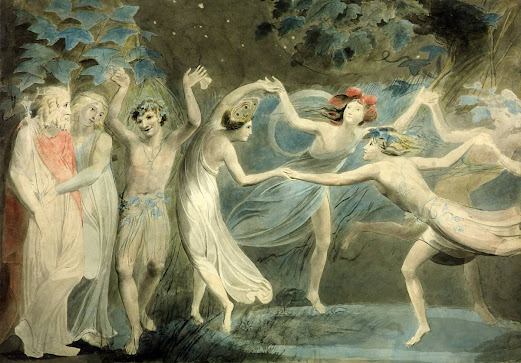A MIDSUMMER NIGHT’S DREAM
THE BINARIES IN SHAKESPEARE'S A MIDSUMMER NIGHT’S DREAM
The use of binary oppositions is a constant technique used in the literature of William Shakespeare, who used characters, places and time frames to represent these contrary ideas exposed in the lecture: the woods and the city. In A Midsummer Night's Dream, the dichotomy is presented by two big blocks which are the opposition between nature and civilization, poles apart that also had been seen in previous lectures, like Sir Gawain and The Green Night, were nature and civilization symbolize the eternal fight between chaos and order that affects many aspects of society, and show different points of view from reality and life. This is presented in the text by playing with the characters and their desires, ultimately playing with their will. In Shakespeare: the Basic( McEvoy, 2000, p.12) is described perfectly the essence of The Woods, the representation of Free Will: “Once in the wood the lovers seem to think that they can choose for themselves, free from state and patriarchal authority.”
The world of nature is ruled by chaos, a place where magic and freedom involve the environment, with so, the living creatures that break into it, also the whimsical place as The Woods, is highlighted by openness within the characters, exempted from any kind of power or sovereignty. This fantasy set, represents freedom and desire at its best, the true nature of human beings, Shakespeare draws a powerful representation of pure feelings, which reflect the pagan roots from humanity . The action in the Woods takes place during nighttime, an element which also represents the previous values, the moment of the day where only these actions end culminating to the climax with the help of the moon, another element which helps to affect in time and characters feelings. The Woods and the whole concept of Night, are the places in the play where the most fantastical scenes happen, and where the plot turns convoluted. In The Woods, we are introduced to the realm of the magical creatures living in it and the relationship between them, Oberon and Titania, The King and Queen of the fairies, rule the world of nature. Puck, Oberon's servant hinders the plot by pouring the juice of the magical flower into the wrong characters (Act III, scene II):
“OBERON: What hast thou done? thou hast mistaken quite
And laid the love-juice on some true love's sight:”
( A Midsummer’s Night Dream, Shakespeare, 1595, 3.2,)
Puck also bewitches Bottom by putting him a donkey head(Act III, Scene I), after that, The Queen of the fairies falls in love with him, because of the magical juice. The place of The Woods in the play, is a also part where situation in which the characters are involved results fun, invevitable no to laugh while reading it.
In the other side, there is a place ruled by order and law, the city of Athens, which is presented as the counterpart of The Woods. This place, as an opposite of The Woods, is rooted in reason, in opposition to magic, and rules and restrictions as opposed to concept of freedom. The city is a place of confinement as the flip side of openness, and the imposition of the marriage institution against the desire of the woods, In Shakespeare: the Basic ( McEvoy, 2000, p.20) “The wood appears to the lovers to be a place of pastoral escape, safe from the power of Theseus and Egeus; that is why they agree to meet there”.The world of civilization and its interaction with the characters of the play is represented during daytime and as the eternal antagonist of its natural contrary, the Night. In The City, the actions carried out are highlighted by the presence of restriction, opposition and the obstruction over the will of the main characters. The influence of political hierarchy, which is the order that powered beings follow (with the king in its top), as an example, the imposition of a non-desired marriage for Hermia, who is forced to marry Demetrius, while she loves Lysander. This freedom of the main character of the play, is the detonating element of the plot, because of her disobedience with her father and, with so, the breaking of the "The Great Chain of Being".
“HERMIA: …But I beseech your grace that I may know
The worst that may befall me in this case, If I refuse to wed Demetrius…”
( A Midsummer’s Night Dream, Shakespeare, 1595, I.I, 65)
In conclusion, Shakespeare’s A Midsummer's Night Dream is a constant comparison between this two opposite worlds, were through the characters of the play, the subjects exposed to this dicotomy of realities, suffer the consequences from both sides. The differences between the binaries is a characteristic from this special work which test the characters with obstacles that they have to confront, with the ultimate goal or aim of breaking the “Chain of Being” maintain their souls trapped in The City.
BIBLIOGRAPHY:
- Shakespeare, William: A Midsummer’s Night Dream. 1595
- McEvoy, Sean. Shakespeare: The Basics. 2000


Comentarios
Publicar un comentario